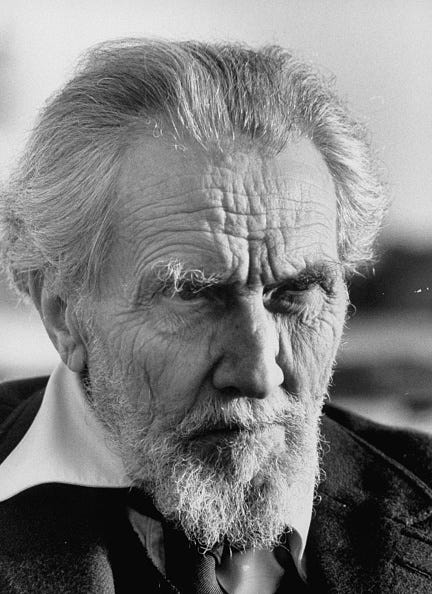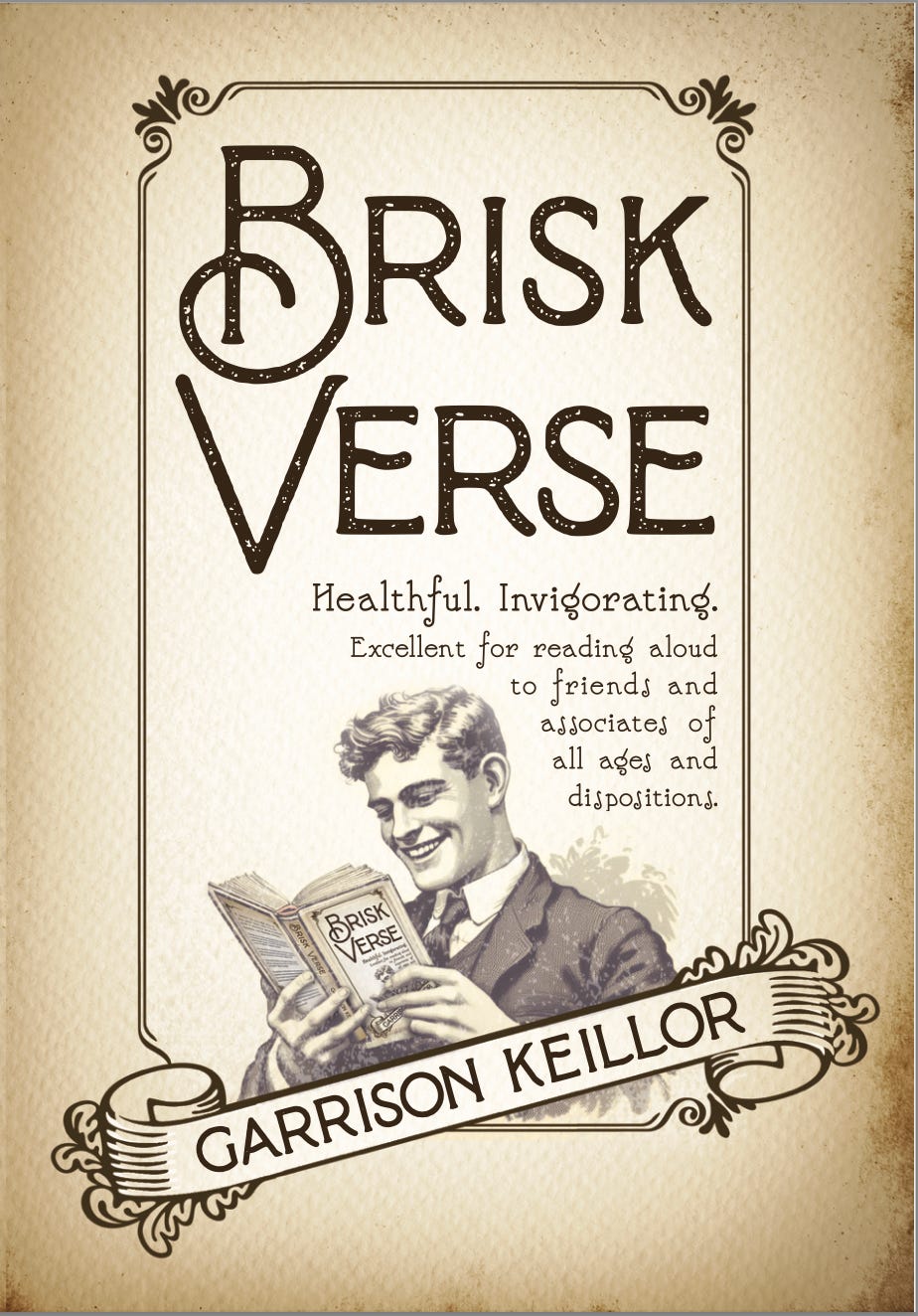The Writer's Almanac from Wednesday, October 30, 2013
"These Few Precepts" by Joyce Sutphen, from First Words. © Red Dragonfly Press, 2010.
ORIGINAL TEXT AND AUDIO - 2013
It was on this day in 1938 that a cylindrical Martian spaceship landed in Grover's Mill, New Jersey, and began incinerating onlookers with an alien heat ray, an event that was covered by the Columbia Broadcasting System and its affiliated stations, and that caused widespread alarm and mass hysteria. News of the attack interrupted a program of live dance music, the reports growing more frequent and ominous as the hour wore on, until the New Jersey state militia had been obliterated and three Martian tripod battle machines began ravaging the landscape.
Of course, the broadcast was a hoax, a cleverly crafted Halloween prank composed of simulated on-the-spot news bulletins based on the H.G. Wells novel, The War of the Worlds. The broadcast had been prefaced with the announcement that what would follow was a dramatic presentation by Orson Welles and the Mercury Theatre on the Air, but many listeners missed the introduction and panic ensued. People in New Jersey fled the area convinced they could smell poison gas and see fiery flashes from the tripods in the distance.
It has been estimated that of the 6 million people who heard the original broadcast, more than 1.5 million believed it to be true and more than a million others were genuinely terrified, and contemporary accounts tell of police stations swamped with calls. Within a month there were more than 12,000 newspaper articles on the broadcast and its impact, and as far away as Germany Adolf Hitler is said to have cited it as "evidence of the decadence and corrupt condition of democracy." Many listeners sued the network for mental anguish, claims that were all denied save one for a pair of size nine black shoes, by a man from Massachusetts who complained he'd had to spend what he'd saved for new shoes to escape the invading Martians. Welles insisted that that claim be reimbursed.
Welles and the Mercury Theatre were censured, but the broadcast secured Welles an instant, notorious fame. In 1988, Grover's Mills, New Jersey, celebrated its hour of fame by installing a Martian Landing Site monument near Grover's Mill Pond, not far from the remains of a water tower shot to pieces by its frightened residents 50 years before.
It's the birthday of the poet and critic Ezra Pound, born in 1885 in Hailey, Idaho. Pound is famous for championing the Modernist movement, and he did this by celebrating and encouraging other writers like W.B. Yeats, Robert Frost, William Carlos Williams, Marianne Moore, H. D., James Joyce, Ernest Hemingway, and T. S. Eliot. He was Yeats's personal secretary, and he wrote articles praising Joyce (and also sent him money and spare clothes,) and he is most famous for taking T.S. Eliot's huge poem The Waste Land and suggesting cuts line by line, and eventually cutting out half of it.
After college, Ezra Pound moved to London, then to Paris, and then in the 1920s to Italy. He stayed in Italy during WWII, and he worked as a propagandist for the Axis powers, and in 1945 he was arrested for treason, and sent back to the U.S. to be tried. He was acquitted the next year, but under the condition that he was mentally ill, so he was put in an asylum. He had many visitors, poets like Elizabeth Bishop and Robert Lowell, and he continued to write, to work on his Cantos, his major work, which was published in ten sections between 1925 and 1969. He even won awards while he was in the asylum. Finally in 1958, after many years of letters and appeals from writers, Pound was released, and he went back to Italy for the rest of his life.
It's the birthday of journalist and biographer Robert Caro, born in New York City (1936), who has spent the last thirty years writing a four volume biography of Lyndon Johnson, for which he has read 34 million documents at the LBJ Library in Austin, Texas, and he has conducted more than 1000 interviews. He lived in Johnson's hometown for three years, so that he could get to know the people there well enough that they would open up to him. He also tracked down every living member of Johnson's grammar school class. The third volume of the biography Master of the Senate came out in 2002 and won the Pulitzer Prize for Biography.
It's the birthday of the second president of the United States, John Adams, born in Quincy, Massachusetts in 1735. While he was young he kept a diary, filled with his observations of people and events, and he used this technique after he grew up and went to Harvard and became a lawyer—he would make detailed notes on cases and then study them and reflect on them later. He was a good writer and philosopher, famous for the articles he wrote in opposition to the British Stamp Act, articles that linked that opposition to the ideals of the first Puritans.
John Adams said, "Democracy never lasts long. It soon wastes, exhausts and murders itself. There was never a democracy that did not commit suicide."
Today is the birthday of the man who said, "Television makes so much at its worst, that it can't afford to do its best." That's the pioneering broadcast journalist Fred W. Friendly, born Ferdinand Friendly Wachenheimer in New York City (1915). While still a boy, Fred and his family moved to Providence, Rhode Island, where after college, Fred changed his name and began work as a reporter for the local radio station. He served as a war correspondent in World War II and joined CBS in 1950. Along with his colleague Edward R. Murrow, whom he'd first worked with in radio, Friendly essentially invented the news documentary for television. Weaving together unrehearsed interviews, reports from the field, and original film clips, his work earned him 10 Peabody Awards over his career. He worked as a producer for Murrow's influential "See it Now" documentaries, including his exposé on Sen. Joseph McCarthy and the Red Scare, and soon took the helm as president of CBS News. A large persuasive man, with strongly held opinions, he frequently butted heads with the network executives over their commitment to hard news over commercial interests. His forthright criticism of the network's priorities caused him to leave CBS in 1966 when coverage of a hearing on Vietnam was scrapped in place of a rerun of I Love Lucy.
Friendly was an outspoken advocate for fairness and ethics in journalism, and after leaving CBS, he developed a series of popular seminars for public television that brought together journalists, educators, and politicians to discuss the most pressing issues of the day. He died at his home in the Bronx in 1998 at the age of 82. His colleague Dan Rather remembered him as "a fierce and mighty warrior for the best [...] principles in journalism, [...] for his friends, and for his country. He never gave up, he never gave in; he never backed down, and he never backed up."
Be well, do good work, and keep in touch.®
BRISK VERSE by Garrison Keillor, a collection of original invigorating verse. Read it to yourself or aloud to friends, family, or passersby. One hundred and thirty-two poems in all — diverse topics, including Brevity, Thongs, Minnesota, Manners, Mozart, Marilyn Monroe, Failure, Fatherhood, Episcopalians, Plumbing, Spaghetti, Spring, Online Love, Eighty, and the National Anthem as it might’ve been written by Whitman, Dickinson, Eliot, Frost, and other poets. Illustrated with quirky antique advertisements for tonics and gizmos. With a foreword by the author.






I did read the text in today’s “The Writer’s Almanac. Perhaps you are referring to another venue?
I thought the opening, initially describing the Martian invasion in a straightforward, factual manner was hilarious (I.e. very nicely echoing the history of broadcast itself).